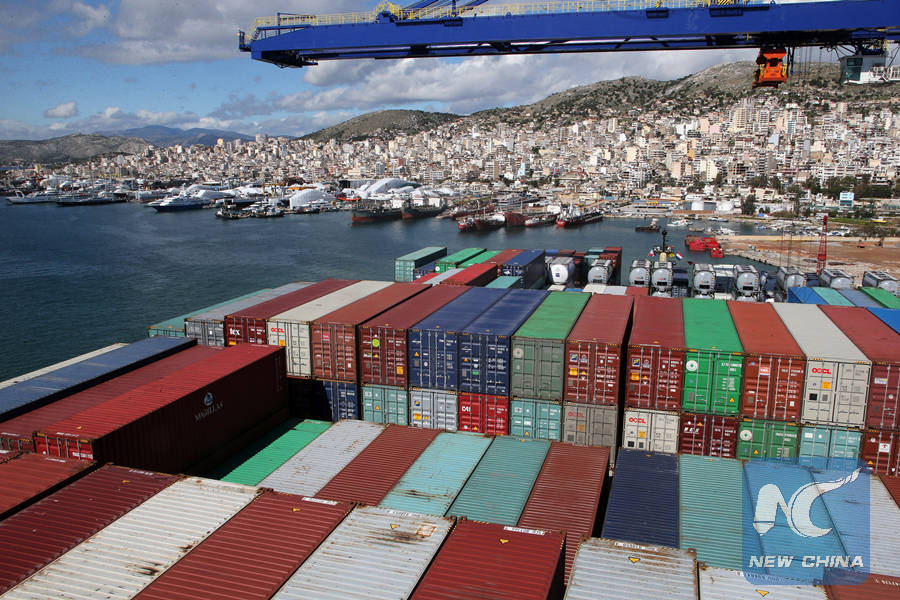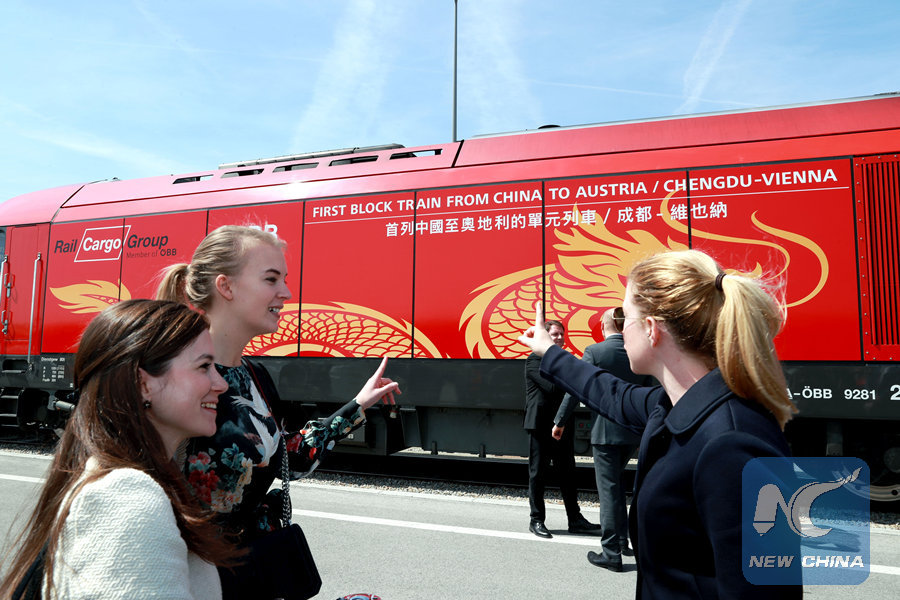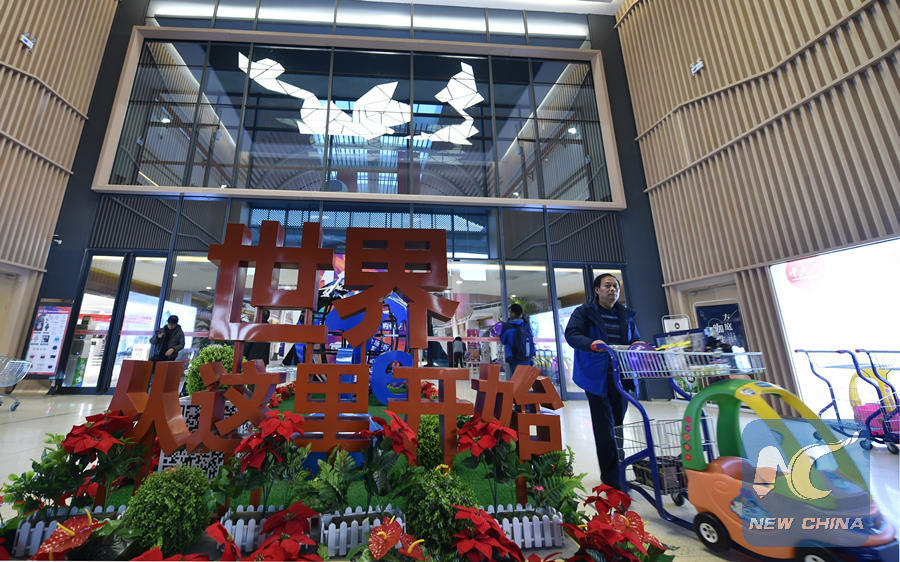by Xinhua Writer Tian Dongdong
BRUSSELS, May 14 (Xinhua) -- What do Europeans think of the Belt and Road (B&R) Initiative?
For citizens in the German city of Duisburg, it is the sirens of trains travelling thousands of miles all the way from China, bringing new jobs and vitality to their city.
For Randi Vinfeldt, who runs a 27-hectare organic pig farm in Ostrup, Denmark, the initiative is a shortcut to China's huge market, where she can "get a good price" for her organic pigs.
For Dejan Gogic, a 37-year-old soya farmer from Belgrade, Serbia's capital, the initiative is a 1.8-km bridge taking its shape on the Sava River, connecting wilderness with future prosperity.
Some 2,000 years ago, our ancestors, trekking across vast steppes and deserts, opened the Silk Road connecting Asia, Europe and Africa. They were remembered not as conquerors but as friendly emissaries.
One year ago, Chinese President Xi Jinping said at the opening ceremony of the Belt and Road Forum for International Cooperation in Beijing that "history is our best teacher ... If we take the first courageous step towards each other, we can embark on a path leading to friendship, shared development, peace, harmony and a better future."
Now, with trains and ships loaded with goods from countries along the route, the initiative is increasingly seen as a bridge connecting hope and opportunity, and an express leading towards win-win results and common prosperity.

Containers on China's COSCO Shipping Taurus are seen at Piraeus port, Greece, on Feb. 26, 2018. (Xinhua/Marios Lolos)
JOBS, JOBS, JOBS
Proposed in 2013, the initiative is a grand infrastructure and trade project aimed at connecting Asia with Europe and Africa along ancient Silk Road routes. It comprises the Silk Road Economic Belt and the 21st Century Maritime Silk Road
In late February, Germany Trade & Invest and Association of German Chambers of Industry and Commerce (DIHK) jointly published a study on the B&R Initiative, showing that 900 billion U.S. dollars had been invested in projects since 2013.
According to the study, the initiative creates a huge economic zone between Asia and Europe, serving as an important driving force for globalization.
Before China's COSCO Shipping came into the Piraeus port in Greece, the "Pearl of the Mediterranean" was listed 93 in the world ranking of cargo tonnage, and now it has climbed to the 38th. Cargoes loaded and unloaded at the port totaled 3.74 million TEUs (20-foot equivalent units) in 2016, up from 880,000 TEUs in 2010, when COSCO Shipping's subsidiary Piraeus Container Terminal took over the management of Piers II and III.
COSCO Shipping is expected to help create 125,000 jobs in the region in the very near future.
In recent years, Duisburg suffered from faltering growth. With the help of the China Railway Express (CRE), volume at the Port of Duisburg grew by 30 percent in 2017, making it the fastest growing port in Germany.
More than 6,000 jobs in logistics have been created for the city, Johannes Pflug, responsible for China affairs in the Duisburg municipality, told Xinhua, adding "we are beneficiary of the CRE trains."
Matteo Bressan, an analyst at NATO Defense College Foundation based in Rome, cited various figures to show that the initiative affects billions of people and involves trillions of dollars in business.
"It is evident that with these numbers we are facing an ambitious project ... (which) encourages new forms of win-win cooperation," Bressan told Xinhua, noting that Italy faces a great opportunity to become a hub of Chinese goods with its ports.
The idea of President Xi to recreate the ancient Silk Road evokes a past characterized by trade, mutual knowledge and cultural development, Bressan said, calling the initiative "unprecedented."

People look at a new China-Europe freight train from Chengdu to Vienna at the Vienna South Freight Center in Vienna, Austria, on April 27, 2018. (Xinhua/Pan Xu)
WIN-WIN
On April 27, a new China-Europe freight train arrived in Vienna, carrying 41 containers of goods valued at 1.5 million U.S. dollars, and included LED displays, tires and lamps.
Departing from China's southwest city of Chengdu 15 days ago, the train traveled 9800 km through Kazakhstan, Russia, Ukraine and Slovakia before pulling into the Vienna South Freight Center.
The China-Europe rail service is considered a significant part of the B&R Initiative. It is expected to boost trade between China and Europe, China's largest trading partner.
For Kosta Gouliamos, rector of European University Cyprus, the initiative has shown its massive effectiveness of strengthening international cooperation.
He noted that during the past five years, especially after last year's Belt and Road forum, construction of numerous projects have commenced, and some of the projects had delivered real benefits to the locals and the regions.
"China's Belt and Road Initiative has triggered the impulse for modernization in the areas far beyond Asia," said Volker Dreier, deputy CEO of DIHK, adding that it has great importance to the whole Germany.
"The strength of companies from Germany and China can complement each other and there is great potential for them to build long-term win-win cooperation," Lothar Herrmann, CEO of Siemens Greater China, told Xinhua.
Carl Fey, professor of International Business at Finland's Aalto University School of Business, said he was impressed to see the initiative develop into "a very sophisticated policy with many details linking many important parts together."
Echoing Fey, Francis Gurry, director-general of the World Intellectual Property Organization, told Xinhua that the initiative is expected to enhance greater international cooperation while fostering ties between participating countries.
"I think the Belt and Road Initiative will support the multilateral framework, enabling participating countries to reinforce and use the international agreements that are in place," said Gurry.

People shop at a bonded commodity shopping center in Zhengzhou City, capital of central China's Henan Province, on Dec. 8, 2017. The Belt and Road Initiative has made the inland Henan Province an emerging frontier of international trade. (Xinhua/Li Jianan)
THE ONLY THING TO FEAR IS FEAR ITSELF
Some Europeans and the Western media have portrayed the Chinese initiative as detrimental to a nation's economy.
A New York Times story last year called China's investment in Greece as "a kind of neocolonialism without the gunboats."
Such a bizarre accusation has been refuted by the Greeks themselves.
Responding to the Times' story, Michail Psylos, president of Athens News Agency-Macedonian Press Agency, told Xinhua that "nobody cares about the NYT report."
The Initiative "gives Greece the room and potential to upgrade its own role in the modern world as a member of the European Union," said the president, adding that "we think the relationship between China and Greece is of strategic and geo-political importance."
Meanwhile, Miguel Sanchez, Spain's EFE Agency's director of economic and financial sector, told Xinhua that China is "growing and becoming more and more competitive each day. The best way to fight against you is to say that you are doing nothing or doing things the wrong way."
Infrastructure investments and other projects within the framework of the initiative are benefitting Serbia and a wider Europe, Neven Cveticanin, a senior research assistant at the Institute of Social Sciences of Serbia, told Xinhua in a recent interview.
Bilateral ties with China have helped improve Serbia's economy and living standards, and also set an example for Central and Eastern European countries to strengthen their cooperation with the Asian country, Cveticanin said.
Franklin D. Roosevelt, the 32nd president of the United States, once told his fellow countrymen at the height of the Great Depression that "the only thing we have to fear is fear itself."
Roosevelt's words can serve as no better admonishment for those who chose to live in fear.
As the world is faced with severe challenges, China is offering its solution to several global problems, not only through capital and investment, but through win-win cooperation, said Gouliamos.
The initiative could be an antidote to the rise in anti-globalization, the rector added.
In his opening remarks during last year's B&R forum, Xi laid bare that China will not resort to outdated geo-political maneuvering during the initiative's expansion.
"What we hope to achieve is a new model of win-win cooperation. We have no intention to form a small group detrimental to stability," said the Chinese president. "What we hope to create is a big family of harmonious co-existence," said the Chinese president.
(Xinhua reporters Xu Yang, Zhu Sheng, Qiao Jihong in Berlin, Chen Zhanjie, Li Jie in Rome, Shi Jianguo in Geneva, Liu Yongqiu in Athens, Wang Tengfei in Vienna, Guo Chunju in Tallinn, Han Mei in Warsaw, Zhang Zhang in Nicosia, Wang Huijuan in Belgrade, Fu Yiming in Stockholm and Li Jizhi in Helsinki also contributed to the story.)

